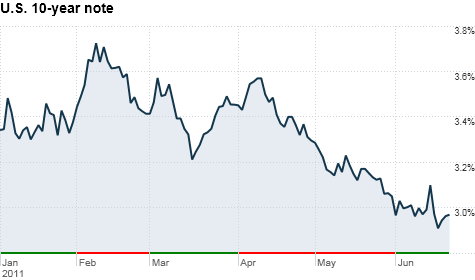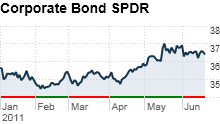Search News

Treasury yields have declined sharply this year as investors have flocked into the safety of government-backed debt. Click chart for more bonds and rates.
NEW YORK (CNNMoney) -- The bond market has begun to look more and more like a seller's market, and experts don't expect that to change anytime soon.
The yield on the benchmark 10-year Treasury note is sitting at its lowest level since November. Yet, with the U.S. economy continuing to slow and Europe's debt problems rearing their ugly head (again), portfolio managers say Treasuries will remain the safe haven of choice.

And that will keep yields low for the foreseeable future.
"Investors are flocking to Treasuries not because they are a great investment, but because they have concerns about other asset classes," said Mike Pond, co-head of U.S. rates strategy with Barclays Capital.
Treasuries remain the biggest drag on a bond portfolio, with Treasury-only bond funds returning a meager 1.5% this year.
In contrast, the Merrill Lynch Domestic Master index, a broad bond index that includes Treasuries, investment-grade corporate bonds and mortgage-backed securities, gained 3.3% from the start of the year. But even that's not likely to continue.
"The return expectations on a bond portfolio have come down considerably from a year ago," said Mark Kiesel, a senior portfolio manager with PIMCO.
Against that dour background, one outstanding question facing fixed income investors is 'who will replace the Fed?' The central bank is winding down its $600 billion bond-buying program this week and many are wondering who will be the next big buyer.
At the same time, inflation has picked up speed in recent months, partly due to higher energy costs.
Yields are so low and inflation concerns so high that Treasury inflation-protected securities (TIPS), or government-backed bonds used to hedge against inflation, are trading with a negative yield of 0.75%.
There are few signs of anything much changing over the next six months. Last week, the Fed said it would keep interest rates near zero percent for the foreseeable future.
Barclays' Pond said the yield on the 10-year note could fall to around 2.5% to 2.6% on a worse-case scenario as the economy enters the traditional summer slowdown period, which could be even slower than typical given all the uncertainties that are swirling about.
"It will take very little for stocks to beat bonds this year," said Margaret Patel, senior portfolio manager with Wells Capital Management. "If you're looking for total return on an investment portfolio, don't look for it in bonds."
Outside of Treasuries, corporate and high-yield, or "junk," bonds remain attractive. But those markets have become so bloated that many investors may have missed the boat.
Corporate bonds have returned 4.2% so far this year, more than double the performance of Treasuries.
Corporate bonds became increasingly attractive to investors this year as balance sheets showed substantial improvement. Corporate default rates are expected to fall to 1.7% -- the lowest level in five years -- according to a recent report by ratings agency Moody's.
Approximately $12 billion flowed into corporate and high-yield bond funds from the start of the year, according to Thomson Reuters.
Kiesel said there is still value to be found in some parts of the corporate debt market, but you have to pick and choose your spots. Banks, metals and mining, pipeline companies and other basic resources firms are areas where he still sees value.
"You need to cherry-pick your companies right now, you can't just go with a broad portfolio of bonds and expect a decent return," Kiesel said
Meanwhile, municipal bonds remain a bit of a wild card.
Munis took a hit earlier this year after prominent Wall Street analyst Meredith Whitney warned that the municipal bond market could face billions of defaults as states, cities and municipalities nationwide struggle to balance their budgets.
The defaults never came, as states worked to fix their budget problems without issuing more debt, but the damage was already done. Approximately $23.7 billion flowed out of municipal bonds in the first half of the year, according to Thomson Reuters.
"It was a catalyst for a lot of the outflows in munis -- particular in the open-end mutual funds," said Jim Colby, a portfolio manager with Van Eck Global. "Until the last couple weeks we basically had nothing but investors heading toward the exits."
Whitney's report isn't carrying the weight it had only a few months ago as individual investors have begun to re-enter the muni market, particularly in the last several weeks. However Colby said muni bond prices are likely to remain depressed through the rest of the year.
"Investors have come back, but there's a great deal of uncertainty in the background feeding concerns for this asset class," Colby said. ![]()
| Index | Last | Change | % Change |
|---|---|---|---|
| Dow | 32,627.97 | -234.33 | -0.71% |
| Nasdaq | 13,215.24 | 99.07 | 0.76% |
| S&P 500 | 3,913.10 | -2.36 | -0.06% |
| Treasuries | 1.73 | 0.00 | 0.12% |
| Company | Price | Change | % Change |
|---|---|---|---|
| Ford Motor Co | 8.29 | 0.05 | 0.61% |
| Advanced Micro Devic... | 54.59 | 0.70 | 1.30% |
| Cisco Systems Inc | 47.49 | -2.44 | -4.89% |
| General Electric Co | 13.00 | -0.16 | -1.22% |
| Kraft Heinz Co | 27.84 | -2.20 | -7.32% |
| Overnight Avg Rate | Latest | Change | Last Week |
|---|---|---|---|
| 30 yr fixed | 3.80% | 3.88% | |
| 15 yr fixed | 3.20% | 3.23% | |
| 5/1 ARM | 3.84% | 3.88% | |
| 30 yr refi | 3.82% | 3.93% | |
| 15 yr refi | 3.20% | 3.23% |
Today's featured rates: